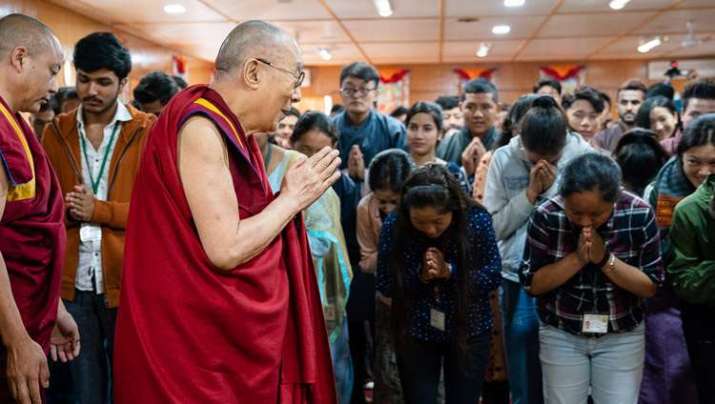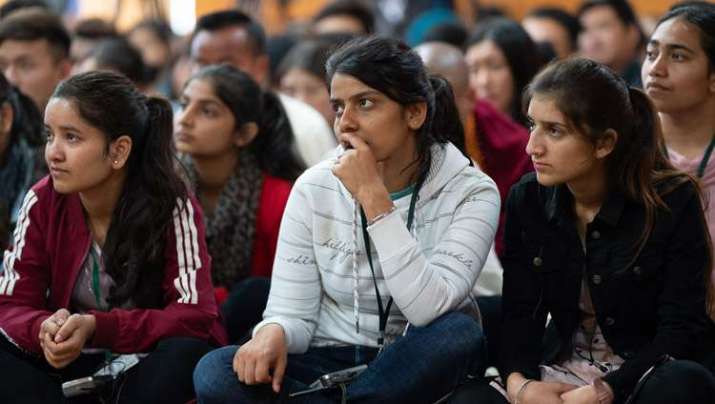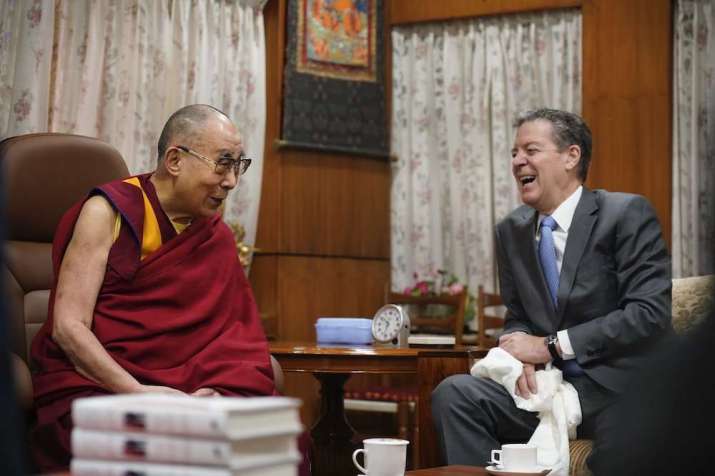NEWS
Dalai Lama Hints at a Possible End to the Reincarnate Lama System
 The Dalai Lama greets students. From dalailama.com
The Dalai Lama greets students. From dalailama.comDuring a meeting with students in Dharamsala on 25 October, His Holiness the Dalai Lama suggested that the long-standing institution in Tibetan Buddhism of reincarnate lamas (Tib: tulkus) may be coming to an end.
Placing his statements in the context of changing political realities, the Dalai Lama noted that, “Institutions need to be owned by the people, not by an individual. Like my own institution, the Dalai Lama’s office, I feel like it is linked to a feudal system.” He continued, “The system should end, or at least change with the changing times. There have been cases of individual lamas who use reincarnation [to get their way] but never pay attention to study and wisdom.” (The Times of India)
The remarks were made before a group of 25 students who are taking part in a six-month course in Ancient Indian Wisdom at the Government College, Dharamsala, along with more than 100 students from several universities in northern India, including 18 Tibetans, 78 Bhutanese, 10 Ladakhis, and four Africans.
 From dalailama.com
From dalailama.comThe remarks follow a long history of the Dalai Lama contemplating the future of the institution and system of power entrusted to reincarnated lamas. In recent years, His Holiness has suggested that he might reincarnate as a female, or ensure that he is reborn in a country outside of Chinese government control, or that he might not reincarnate at all, bringing an end to the centuries-old lineage.
Repeating some of the comments he had made earlier in the week during an audience with the International Network of Engaged Buddhists, the Dalai Lama told the students: “Many of the problems we face are of our own making, but because that is the case, we can also take steps to solve and reduce them. In this latter part of my life, I am trying to revive interest in ancient Indian thought, especially key values like ahimsa (Skt. non-violence) and karuna (Skt. compassion), because the world today needs such standards. Last century, Mahatma Gandhi showed how these principles could be implemented in daily life.” He continued, “Modern education enables us to make external development, which is necessary, but it needs to be combined with a better understanding of the mind.” (His Holiness the 14th Dalai Lama of Tibet)
On Monday, the US Ambassador at Large for International Religious Freedom Sam Brownback met with the Dalai Lama in his official home to discuss the topic of religious freedom.
 Sam Brownback meets with the Dalai Lama in Dharamsala From tibet.net
Sam Brownback meets with the Dalai Lama in Dharamsala From tibet.net“Inspired and deeply moved after my meeting with His Holiness the Dalai Lama in India,” Brownback said in a tweet. “He is living testament of the power of religious freedom to overcome hate, division, and intolerance. I’m stirred in my own faith to work harder for religious freedom for all, including Tibetans.” (NDTV)
Speaking at a conference hosted by the Tibetan Institute for Performing Arts, Brownback continued: “The role of picking a successor to the Dalai Lama belongs to the Tibetan Buddhist system, the Dalai Lama, and other Tibetan leaders. It does not belong to anybody else, not any government or any entity.” (Radio Free Asia)
Brownback is on a multination tour of Asia, with stops planned in Nepal to speak with leaders, and Thailand, where he will deliver remarks at the 5th Annual Southeast Asia Freedom of Religion or Belief Conference on 2 November.
Meanwhile, the US ambassador to India, Kenneth Juster, visited Tawang in the northeast Indian state of Arunachal Pradesh. The area is home to several thriving Buddhist communities under Indian administration, yet is claimed by China in an unresolved territorial dispute. The visits by Juster and Brownback are seen by many as attempts to rebalance the scales of influence in the region, where religious practices and freedoms are central to the lives of millions of Buddhists.
While the Dalai Lama is the most widely recognized tulku in the world, he does not have any direct authority over other lamas who have been recognized as reincarnated teachers, either within his own Gelug school of Tibetan Buddhism, or in any other tradition. The oldest ongoing line of tulkus is that of the Karmapas of the Karma Kagyu tradition, currently held by His Holiness the 17th Gyalwang Karmapa, Ogyen Trinley Dorje.
See more
Reincarnation feudal, should end now: Dalai Lama amid successor row with China (The Times of India)
Addressing Students from North Indian Universities (His Holiness the 14th Dalai Lama of Tibet)
US Diplomat On Religious Freedom Meets Dalai Lama At Dharamshala (NDTV)
Dalai Lama’s Successor Will be Chosen by Tibetans, not by China: US Envoy (Radio Free Asia)
Related news from Buddhistdoor Global
Dalai Lama Meets with Members of the International Network of Engaged Buddhists
Chinese Officials Caution India Against Involvement in Dalai Lama Reincarnation Issue
Himalayan Issues Offer Path Forward as Chinese and Indian Leaders Meet
Dalai Lama Speaks on Reincarnation, Sadness, and the Continued Need for Nonviolence
Beijing Rejects Dalai Lama’s Assertion that Next Incarnation May Be Born in India
Buddhist Documentary Becoming Who I Was Picked Up for US Distribution after World Premier in Berlin
Related features from Buddhistdoor Global
Rediscovering Lamaism — The Western Relationship with Tibetan Buddhism
The Special Friendship of Vaclav Havel and the Dalai Lama, Born from the Emergence of Freedom in Post-Communist Czechoslovakia
Exclusive Interview: The 17th Karmapa and the Buddhist Nuns of the Tibetan tradition














